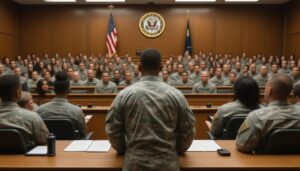Avoiding AWOL: Defending Against Article 86 Violations Under the UCMJ
Introduction: A Common Challenge for Servicemembers
Imagine you’ve been serving honorably, fulfilling your duties day in and day out. Suddenly, personal or family circumstances lead you to miss movement for a key deployment, or you fail to return from leave on time. You discover you are now under investigation for violating Article 86 of the UCMJ, commonly known as “AWOL” (Absent Without Leave) or “UA” (Unauthorized Absence) in some branches. In the eyes of the military justice system, even a short unauthorized absence can have serious repercussions, potentially affecting your career, benefits, and reputation.
Allegations under Article 86 can arise in many ways, from failing to report for duty at the designated time to missing a flight for deployment. While some cases involve intentional absence, others stem from misunderstandings, logistical errors, or emergency situations beyond the servicemember’s control. Regardless of the reasons, facing an AWOL charge can be nerve-racking, particularly as it may intersect with other disciplinary or administrative actions like CID investigations, GOMOR rebuttals, or even an administrative separation board.
This article aims to clarify the key legal aspects of Article 86, discuss how AWOL matters might overlap with issues like false sexual assault allegations or command-initiated investigations, and provide actionable defense strategies. Whether you are dealing with a short-term absence or a prolonged period of unauthorized leave, understanding your rights and responsibilities under the Uniform Code of Military Justice (UCMJ) is the first step toward protecting your future in uniform.
Understanding Article 86 of the UCMJ
Article 86 of the UCMJ outlines the offense of going absent without leave. The punishments can vary greatly depending on factors like the length of absence, duty status, and circumstances surrounding your departure. Article 86 generally covers:
- Failure to Go to Appointed Place of Duty: Missing formation, failing to show up for guard duty, or not reporting to a mandatory meeting at the specified time and place.
- Leaving Appointed Place of Duty: Departing before authorized dismissal or wandering away from a location where you are supposed to remain.
- Absent Without Leave (AWOL): Being away from your unit, organization, or place of duty for a certain period without proper permission or leave authorization.
- Desertion vs. AWOL: If the prosecution believes you intended to remain away permanently, the charge can escalate to “desertion” (Article 85). Although similar, desertion carries harsher penalties.
For more specific information on how the military defines and prosecutes AWOL and other offenses, consult the Joint Service Committee on Military Justice website, which offers resources and policy updates on UCMJ statutes.
Why AWOL Charges Matter: Consequences and Career Impact
An Article 86 violation can severely disrupt your life and career for reasons that may not be immediately apparent. Consider:
- Administrative Actions: AWOL can lead to negative counseling statements, a bar to reenlistment, or an administrative separation board if the command deems the offense severe.
- Non-Judicial Punishment (Article 15): If the absence is relatively short and deemed minor, the command might pursue non-judicial punishment (NJP). Penalties can include rank reduction, forfeiture of pay, or extra duty.
- Court-Martial: Longer or repeated AWOL periods could result in a Special or General Court-Martial. This could lead to a criminal record, confinement, or even a punitive discharge.
- Career Stagnation: Any judicial or administrative finding of AWOL can derail promotion opportunities, limit assignments, and tarnish your service record.
- Financial & Familial Stress: Prolonged absence from your unit may disrupt financial stability (loss of pay, possible recoupment) and create strain in personal relationships.
Defending against AWOL allegations is critical, not just to avoid immediate sanctions but also to preserve your long-term career trajectory and reputation within the military. Keep in mind that other parallel investigations (e.g., CID investigations for different issues) may be triggered or complicated by an AWOL finding.
Common Misunderstandings Leading to AWOL Allegations
 While some absences are deliberate, many servicemembers charged under Article 86 never intended to break the rules. Common scenarios include:
While some absences are deliberate, many servicemembers charged under Article 86 never intended to break the rules. Common scenarios include:
- Travel Delays or Miscommunication: Missing a connecting flight, facing unforeseen travel restrictions, or receiving unclear guidance about return dates can all lead to unintentional lateness.
- Medical or Family Emergencies: In cases of sudden hospitalization or a dire family crisis, a servicemember might leave without properly coordinating with the chain of command.
- Administrative Errors: Paperwork mix-ups or an incorrect understanding of your leave authorization can result in official records showing AWOL despite your good faith belief that you were on valid leave.
- Conflicting Orders: Your command might instruct you one way, while another authority figure issues a different directive, causing confusion over the correct place and time to report.
Proving that your absence was due to an error or extenuating circumstances can mitigate or even negate claims that you willfully abandoned your duties. A thorough investigation of the facts—coupled with competent legal advocacy—can be instrumental in either dismissing the charges or reducing potential penalties.
How AWOL Intersects with Other Military Investigations and Offenses
An AWOL charge can easily become entwined with other aspects of military law. For instance, if you are also under investigation for false sexual assault allegations, your unauthorized absence may be viewed as an attempt to evade scrutiny. Likewise, you might be subject to a GOMOR (General Officer Memorandum of Reprimand) if your command perceives broader misconduct patterns.
Here are a few ways AWOL intersects with common military legal scenarios:
- False Sexual Assault Allegations: A soldier accused of wrongdoing, such as a violation under Article 120 UCMJ, might fear an unfair trial and go AWOL in a panic. This flight can worsen legal outcomes and reinforce the command’s suspicion.
- CID Investigations: If you are already under investigation by the Criminal Investigation Division, failing to appear at designated interviews or ignoring orders to remain on post can result in additional charges under Article 86.
- GOMOR Rebuttal: A GOMOR may be issued for various infractions. Going AWOL while you are supposed to be drafting a rebuttal can undercut your credibility and compromise your ability to fight the memorandum effectively.
- Cross-Examining Cluster B Personality Disorders: In cases where mental health or personality disorders are factors—for either the accused or a key witness—motives behind unauthorized absences can become highly scrutinized. A well-prepared attorney may use mental health issues to contextualize events, if relevant and substantiated.
The overlap of issues underscores how crucial it is to take a unified approach to your defense, ensuring that every angle—administrative, legal, and personal—is comprehensively addressed.
The Role of a Civilian Military Defense Lawyer in AWOL Cases
While you can rely on appointed military defense counsel for Article 86 matters, consider engaging a civilian military defense lawyer if your case is particularly complex or career-threatening. A civilian attorney often has more time, flexibility, and specialized expertise to:
- Investigate Thoroughly: From obtaining video footage at airports to identifying contradictory orders, a dedicated civilian attorney can track down evidence that clarifies or justifies your absence.
- Challenge Command Influence: If command-level bias is influencing how your AWOL case is being prosecuted, an attorney can highlight irregularities and push back against unjust or excessive charges.
- Negotiate Resolutions: In instances where the evidence is not fully in your favor, a skilled civilian lawyer can negotiate a better outcome—such as reduced sentencing in an Article 15 proceeding or lesser charges at a court-martial.
- Handle Parallel Issues: If your AWOL charge intersects with matters like false sexual assault allegations or a GOMOR rebuttal, you benefit from a unified strategy that prevents contradictory defenses.
For official guidelines on legal assistance and military defense counsel, you can reference the U.S. Army’s official website. Though each service branch offers different resources, they all share a commitment to fair representation of servicemembers, especially when it comes to serious allegations like AWOL.
Defenses and Strategies for Article 86 Cases
Below are commonly invoked defenses and strategies that a servicemember might use to combat or mitigate an AWOL charge:
- Legitimate Emergency or Necessity
- If a family member fell gravely ill or you encountered a life-threatening personal emergency, you may argue that departing was the only viable option at the time.
- Lack of Mental Capacity or Intent
- If mental health conditions (e.g., severe depression, anxiety) impaired your judgment, you might not have formed the requisite intent to violate Article 86 willfully.
- Mistake of Fact
- Perhaps you genuinely believed you were authorized to leave or that your leave had been extended. Documentation, such as email correspondence or leave forms, can bolster this defense.
- Involuntary Absence
- Unexpected circumstances—like car accidents, weather cancellations, or kidnappings—could render your absence involuntary. Although rare, these scenarios do occur and can fully exonerate you.
- Procedural Errors
- All AWOL charges must follow due process. If the command mishandled evidence, relied on hearsay, or violated your rights under the UCMJ, the charges might be dismissed or reduced.
- Character References and Prior Service Record
- Positive character letters from your chain of command, peers, and community members can mitigate punishments. If you have a record of exemplary service, highlight that to show the absence was an aberration.
Regardless of which defense you pursue, consistency, thoroughness, and legal guidance are essential. The more diligently you build your case and document every relevant detail, the better your chances of achieving a favorable outcome.
Navigating GOMOR Rebuttals in AWOL Contexts
If your AWOL issue is severe enough to draw the attention of a general officer, you might receive a GOMOR. Although not a criminal charge, a GOMOR can be career-ending if permanently filed in your Official Military Personnel File (OMPF). You have the right to respond with a GOMOR rebuttal.
Best Practices for a GOMOR Rebuttal:
- Timely Submission: Most commands grant a limited window (often 7-10 days) to respond. Do not delay.
- Respectful Yet Firm Tone: Demonstrate professionalism while strongly contesting or explaining the circumstances of the AWOL event.
- Documented Evidence: Attach any proof—from text messages to medical documents—showing that your absence was either involuntary or understandable under the circumstances.
- Compelling Character References: Letters from superiors, co-workers, or community leaders can underscore your reliability and highlight any service accolades.
- Legal Assistance: An attorney can refine your rebuttal for maximum persuasive effect, ensuring you address each point cited in the GOMOR thoroughly.
A successful GOMOR rebuttal can result in a reduced or locally filed reprimand, sparing your permanent record. In the best-case scenario, the issuing authority might rescind the memorandum entirely.
Preparing for an Administrative Separation Board
An extended AWOL episode can trigger an administrative separation board, where officers or senior NCOs evaluate whether you should remain in service. You have the right to present evidence, cross-examine witnesses, and be represented by counsel. The outcomes range from retention to various discharge characterizations—Honorable, General, or Other Than Honorable.
Key Steps in Preparing for a Separation Board:
- Gather Statements: Your chain of command, medical professionals, and personal witnesses can all testify to your reliability, dedication, or extenuating circumstances.
- Consult a Civilian Military Defense Lawyer: Such representation ensures you have a comprehensive defense strategy, especially if other allegations (e.g., false sexual assault allegations) are in play.
- Submit Written Evidence: Documentation, including leave forms, flight records, or relevant communication logs, can bolster your case that your absence was not willful.
- Practice Testimony: Work with your counsel to prepare for direct questioning and potential cross-examination. Stay consistent and factual.
A favorable outcome might see you returned to duty with no further penalties, while an unfavorable decision could result in a discharge affecting your VA benefits and future civilian employment opportunities.
Case Study: AWOL Due to Family Crisis
Consider a hypothetical scenario: A soldier stationed overseas learns of a sudden death in the family but is unable to secure emergency leave orders in time. Distraught, they depart anyway, leaving their unit without approval. Upon returning, they face Article 86 charges.
In such a case, the defense strategy might include:
- Proving Immediate Necessity: Present evidence of the family tragedy, efforts to reach the Red Cross or the chain of command, and any communication logs that show attempts to secure leave.
- Character and Service Records: Emphasize a previously spotless record, good conduct, and strong performance evaluations.
- Legal Negotiations: A civilian military defense lawyer can often engage with the command to resolve the matter via non-judicial punishment or a lower-level administrative response, instead of a court-martial.
This case study illustrates how personal emergencies, combined with bureaucratic delays, can lead well-intentioned servicemembers into unintended legal jeopardy. Thorough documentation and legal guidance are vital to obtaining a fair resolution.
Frequently Asked Questions (FAQ)
Q: Will I automatically be court-martialed for AWOL?
A: Not necessarily. Commands look at factors like length of absence, prior record, and intent. Minor or first-time offenses often result in non-judicial punishment or administrative actions rather than full court-martial.
Q: How does AWOL differ from desertion under the UCMJ?
A: Both involve unauthorized absence, but desertion (Article 85) requires the prosecution to prove intent to remain away permanently. AWOL is usually charged when a soldier has no such established intent.
Q: Could an AWOL charge affect ongoing investigations into false sexual assault allegations?
A: Yes. If your absence appears to be an attempt to evade an investigation—especially one related to Article 120 UCMJ—the command may view this as aggravating evidence of guilt. Conversely, in some cases, the two matters might remain separate.
Q: Why consider a civilian military defense lawyer for an AWOL case?
A: A civilian military defense lawyer can devote more resources to your case, negotiate with the command, identify procedural errors, and manage other overlapping issues such as CID investigations or GOMOR rebuttals.
Conclusion and Call to Action
While going AWOL under Article 86 may stem from complex or even dire situations, the military justice system often views unauthorized absences gravely. From potential demotions and financial penalties to court-martial convictions and administrative separation, the consequences can be life-changing. Understanding your rights, documenting your actions thoroughly, and seeking qualified legal counsel can make all the difference between a best-case scenario and a career-ending outcome.
Remember, you do not have to navigate these challenges alone. If you’re facing an AWOL charge—whether it intersects with cross-examining Cluster B personality disorders, false sexual assault allegations, or other UCMJ accusations—a robust defense strategy is your strongest ally.
If you or a loved one are facing legal issues in the military, contact Gonzalez & Waddington, Civilian Military Defense Lawyers, at 1-800-921-8607 for a free consultation. Our experienced team represents servicemembers worldwide.



